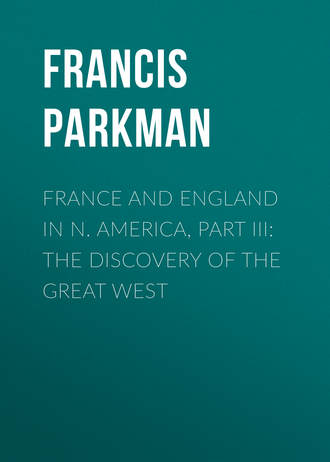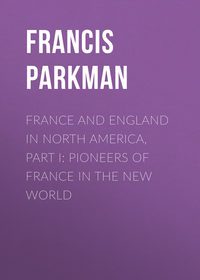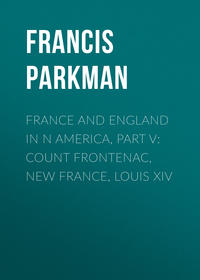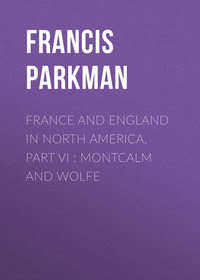 полная версия
полная версияFrance and England in N. America, Part III: The Discovery of the Great West
It has been asserted that the Illinois country was visited by two priests, some time before the visit of Marquette. This assertion was first made by M. Noiseux, late Grand Vicar of Quebec, who gives no authority for it. Not the slightest indication of any such visit appears in any contemporary document or map thus far discovered. The contemporary writers, down to the time of Marquette and La Salle, all speak of the Illinois as an unknown country. The entire groundlessness of Noiseux's assertion is shown by Shea in a paper in the "Weekly Herald," of New York, April 21, 1855.]
CHAPTER VI. 1673-1678. LA SALLE AND FRONTENAC
OBJECTS OF LA SALLE.—HIS DIFFICULTIES.—OFFICIAL CORRUPTION IN CANADA. —THE GOVERNOR OF MONTREAL.—PROJECTS OF FRONTENAC.—CATARAQUI.—FRONTENAC ON LAKE ONTARIO.—FORT FRONTENAC.—SUCCESS OF LA SALLE.
We turn from the humble Marquette, thanking God with his last breath that he died for his Order and his faith; and by our side stands the masculine form of Cavelier de la Salle. Prodigious was the contrast between the two discoverers: the one, with clasped hands and upturned eyes, seems a figure evoked from some dim legend of mediaeval saintship; the other, with feet firm planted on the hard earth, breathes the self-relying energies of modern practical enterprise. Nevertheless, La Salle was a man wedded to ideas, and urged by the steady and considerate enthusiasm, which is the life-spring of heroic natures. Three thoughts, rapidly developing in his mind, were mastering him, and engendering an invincible purpose. First, he would achieve that which Champlain had vainly attempted, and of which our own generation has but now seen the accomplishment,—the opening of a passage to India and China across the American continent. Next, he would occupy the Great West, develop its commercial resources, and anticipate the Spaniards and the English in the possession of it. Thirdly,—for he soon became convinced that the Mississippi discharged itself into the Gulf of Mexico,—he would establish a fortified post at its mouth, thus securing an outlet for the trade of the interior, checking the progress of the Spaniards, and forming a base, whence, in time of war, their northern provinces could be invaded and conquered.
Here were vast projects, projects perhaps beyond the scope of private enterprise, conceived and nursed in the brain of a penniless young man. Two conditions were indispensable to their achievement. The first was the countenance of the Canadian authorities, and the second was money. There was but one mode of securing either, to appeal to the love of gain of those who could aid the enterprise. Count Frontenac had no money to give; but he had what was no less to the purpose, the resources of an arbitrary power, which he was always ready to use to the utmost. From the manner in which he mentions La Salle in his despatches, it seems that the latter succeeded in gaining his confidence very soon after he entered upon his government. There was a certain similarity between the two men. Both were able, resolute, and enterprising. The irascible and fiery pride of the noble found its match in the reserved and seemingly cold pride of the ambitious young burgher. Their temperaments were different, but the bases of their characters were alike, and each could perfectly comprehend the other. They had, moreover, strong prejudices and dislikes in common. With his ruined fortune, his habits of expenditure, the exigent demands of his rank and station, and the wretched pittance which he received from the king of three thousand francs a year, Frontenac was not the man to let slip any reasonable opportunity of bettering his condition. [Footnote: That he engaged in the fur-trade, was notorious. In a letter to the Minister Seignelay, 13 Oct. 1681, Duchesneau, Intendant of Canada, declares that Frontenac used all the authority of his office to favor those interested in trade with him, and that he would favor nobody else. The Intendant himself had a rival interest in the same trade.] La Salle seems to have laid his plans before him as far as he had at this time formed them, and a complete understanding was established between them. Here was a great point gained. The head of the colony was on his side. It remained to raise money, and this was a harder task. La Salle's relations were rich, evidently proud of him, and anxious for his advancement. As his schemes developed, they supplied him with means to pursue them, and one of them in particular, his cousin François Plet, became largely interested in his enterprises. [Footnote: Papiers de Famille, MSS.] Believing that his projects, if carried into effect, would prove a source of immense wealth to all concerned in them, and gifted with a rare power of persuasion when he chose to use it, La Salle addressed himself to various merchants and officials of the colony, and induced some of them to become partners in his adventure. But here we are anticipating. Clearly to understand his position, we must revert to the first year of Frontenac's government.
No sooner had that astute official set foot in the colony than, with an eagle eye, he surveyed the situation, and quickly comprehended it. It was somewhat peculiar. Canada lived on the fur-trade, a species of commerce always liable to disorders, and which had produced, among other results, a lawless body of men known as coureurs de bois, who followed the Indians in their wanderings, and sometimes became as barbarous as their red associates. The order-loving king who swayed the destinies of France, taking umbrage at these irregularities, had issued mandates intended to repress the evil, by prohibiting the inhabitants of Canada from leaving the limits of the settled country; and requiring the trade to be carried on, not in the distant wilderness, but within the bounds of the colony. The civil and military officers of the crown, charged with the execution of these ordinances, showed a sufficient zeal in enforcing them against others, while they themselves habitually violated them; hence, a singular confusion, with abundant outcries, complaint, and recrimination. Prominent among these officials was Perrot, Governor of Montreal, who must not be confounded with Nicolas Perrot, the voyageur. The Governor of Montreal, though subordinate to the Governor-General, held great and arbitrary power within his own jurisdiction. Perrot had married a niece of Talon, the late Intendant, to whose influence he owed his place. Confiding in this powerful protection, he gave free rein to his headstrong-temper, and carried his government with a high hand, berating and abusing anybody who ventured to remonstrate. The grave fathers of St. Sulpice, owners of Montreal, were the more scandalized at the behavior of their military chief, by reason of a certain burlesque and gasconading vein which often appeared in him, and which they regarded as unseemly levity. [Footnote: Perrot received his appointment from the Seminary of St. Sulpice, on Talon's recommendation, but he afterwards applied for and gained a royal commission, which, as he thought, made him independent of the priests.]
Perrot, through his wife's uncle, had obtained a grant of the Island above Montreal, which still bears his name. Here he established a trading house which he placed in charge of an agent, one Brucy, who, by a tempting display of merchandise and liquors, intercepted the Indians on their yearly descent to trade with the French, and thus got possession of their furs, in anticipation of the market of Montreal. Not satisfied with this, Perrot, in defiance of the royal order, sent men into the woods to trade with the Indians in their villages, and it is said even used his soldiers for this purpose, under cover of pretended desertion. [Footnote: The original papers relating to the accusations against Perrot are still preserved in the ancient records of Montreal.] The rage of the merchants of Montreal may readily be conceived, and when Frontenac heard of the behavior of his subordinate he was duly incensed.
It seems, however, to have occurred, or to have been suggested to him, that he, the Governor-General might repeat the device of Perrot on a larger scale and with more profitable results. By establishing a fortified trading post on Lake Ontario, the whole trade of the upper country might be engrossed, with the exception of that portion of it which descended by the river Ottawa, and even this might in good part be diverted from its former channel. At the same time, a plan of a fort on Lake Ontario might be made to appear as of great importance to the welfare of the colony; and in fact, from one point of view, it actually was so. Courcelles, the late governor, had already pointed out its advantages. Such a fort would watch and hold in check the Iroquois, the worst enemy of Canada; and, with the aid of a few small vessels, it would intercept the trade which the upper Indians were carrying on through the Iroquois country with the English and Dutch of New York. Frontenac learned from La Salle that the English were intriguing both with the Iroquois and with the tribes of the Upper Lakes, to induce them to break the peace with the French, and bring their furs to New York. [Footnote: Lettre de Frontenac à Colbert, 13 Nov. 1678.] Hence the advantages, not to say the necessity, of a fort on Lake Ontario were obvious. But, while it would turn a stream of wealth from the English to the French colony, it was equally clear that the change might be made to inure, not to the profit of Canada at large, but solely to that of those who had control of the fort; or, in other words, that the new establishment might become an instrument of a grievous monopoly. This Frontenac and La Salle well understood, and there can be no reasonable doubt that they aimed at securing such a monopoly: but the merchants of Canada understood it, also; and hence they regarded with distrust any scheme of a fort on Lake Ontario.
Frontenac, therefore, thought it expedient "to make use," as he expresses it, "of address." He gave out merely that he intended to make a tour through the upper parts of the colony with an armed force, in order to inspire the Indians with respect, and secure a solid peace. He had neither troops, money, munitions, nor means of transportation; yet there was no time to lose, for should he delay the execution of his plan it might be countermanded by the king. His only resource, therefore, was in a prompt and hardy exertion of the royal authority; and he issued an order requiring the inhabitants of Quebec, Montreal, Three Rivers, and other settlements to furnish him, at their own cost, as soon as the spring sowing should be over, with a certain number of armed men besides the requisite canoes. At the same time, he invited the officers settled in the country to join the expedition, an invitation which, anxious as they were to gain his good graces, few of them cared to decline. Regardless of murmurs and discontent, he pushed his preparation vigorously, and on the third of June left Quebec with his guard, his staff, a part of the garrison of the Castle of St. Louis, and a number of volunteers. He had already sent to La Salle, who was then at Montreal, directing him to repair to Onondaga, the political centre of the Iroquois, and invite their sachems to meet the Governor in council at the Bay of Quinté on the north of Lake Ontario. La Salle had set out on his mission, but first sent Frontenac a map, which convinced him that the best site for his proposed fort was the mouth of the Cataraqui, where Kingston now stands. Another messenger was accordingly despatched, to change the rendezvous to this point.
Meanwhile, the Governor proceeded, at his leisure, towards Montreal, stopping by the way to visit the officers settled along the bank, who, eager to pay their homage to the newly risen sun, received him with a hospitality, which, under the roof of a log hut, was sometimes graced by the polished courtesies of the salon and the boudoir. Reaching Montreal, which he had never before seen, he gazed we may suppose with some interest at the long row of humble dwellings which lined the bank, the massive buildings of the seminary, and the spire of the church predominant over all. It was a rude scene, but the greeting that awaited him savored nothing of the rough simplicity of the wilderness. Perrot, the local governor, was on the shore with his soldiers and the inhabitants, drawn up under arms, and firing a salute, to welcome the representative of the king. Frontenac was compelled to listen to a long harangue from the Judge of the place, followed by another from the Syndic. Then there was a solemn procession to the church, where he was forced to undergo a third effort of oratory from one of the priests. Te Deum followed, in thanks for his arrival, and then he took refuge in the fort. Here he remained thirteen days, busied with his preparations, organizing the militia, soothing their mutual jealousies, and settling knotty questions of rank and precedence. During this time every means, as he declares, was used to prevent him from proceeding, and among other devices a rumor was set on foot that a Dutch fleet, having just captured Boston, was on its way to attack Quebec. [Footnote: Lettre de Frontenac à Colbert, 13 Nov. 1673, MS. This rumor, it appears, originated with the Jesuit Dablon.—Journal du Voyage du Comte de Frontenac au Lac Ontario. MS. The Jesuits were greatly opposed to the establishment of forts and trading posts in the upper country, for reasons that will appear hereafter.]
Having sent men, canoes, and baggage, by land, to La Salle's old settlement of La Chine, Frontenac himself followed on the twenty-eighth of June. He now had with him about four hundred men, including Indians from the missions, and a hundred and twenty canoes, besides two large flatboats, which he caused to be painted in red and blue, with strange devices, intended to dazzle the Iroquois by a display of unwonted splendor. Now their hard task began. Shouldering canoes through the forest, dragging the flatboats along the shore, working like beavers, sometimes in water to the knees, sometimes to the armpits, their feet cut by the sharp stones, and they themselves well nigh swept down by the furious current, they fought their way upward against the chain of mighty rapids that break the navigation of the St. Lawrence. The Indians were of the greatest service. Frontenac, like La Salle, showed from the first a special faculty of managing them; for his keen, incisive spirit was exactly to their liking, and they worked for him as they would have worked for no man else. As they approached the Long Saut, rain fell in torrents, and the Governor, without his cloak, and drenched to the skin, directed in person the amphibious toil of his followers. Once, it is said, he lay awake all night, in his anxiety lest the biscuit should be wet, which would have ruined the expedition. No such mischance took place, and at length the last rapid was passed, and smooth water awaited them to their journey's end. Soon they reached the Thousand Islands, and their light flotilla glided in long file among those watery labyrinths, by rocky islets, where some lonely pine towered like a mast against the sky; by sun-scorched crags, where the brown lichens crisped in the parching glare; by deep dells, shady and cool, rich in rank ferns, and spongy, dark green mosses; by still coves, where the water-lilies lay like snow-flakes on their broad, flat leaves; till at length they neared their goal, and the glistening bosom of Lake Ontario opened on their sight.
Frontenac, to impose respect on the Iroquois, now set his canoes in order of battle. Four divisions formed the first line, then, came the two flatboats; he himself, with his guards, his staff, and the gentlemen volunteers, followed, with the canoes of Three Rivers on his right, and those of the Indians on his left, while two remaining divisions formed a rear line. Thus, with measured paddles, they advanced over the still lake, till they saw a canoe approaching to meet them. It bore several Iroquois chiefs, who told them that the dignitaries of their nation awaited them at Cataraqui, and offered to guide them to the spot. They entered the wide mouth of the river, and passed along the shore, now covered by the quiet little city of Kingston, till they reached the point at present occupied by the barracks, at the western end of Cataraqui bridge. Here they stranded their canoes and disembarked. Baggage was landed, fires lighted, tents pitched, and guards set. Close at hand, under the lee of the forest, were the camping sheds of the Iroquois, who had come to the rendezvous in considerable numbers.
At daybreak of the next morning, the thirteenth of July, the drums beat, and the whole party were drawn up under arms. A double line of men extended from the front of Frontenac's tent to the Indian camp, and through the lane thus formed, the savage deputies, sixty in number, advanced to the place of council. They could not hide their admiration at the martial array of the French, many of whom were old soldiers of the Regiment of Carignan, and when they reached the tent, they ejaculated their astonishment at the uniforms of the Governor's guard who surrounded it. Here the ground had been carpeted with the sails of the flatboats, on which the deputies squatted themselves in a ring and smoked their pipes for a time with their usual air of deliberate gravity, while Frontenac, who sat surrounded by his officers, had full leisure to contemplate the formidable adversaries whose mettle was hereafter to put his own to so severe a test. A chief named Garakontié, a noted friend of the French, at length opened the council, in behalf of all the five Iroquois nations, with expressions of great respect and deference towards "Onontio"; that is to say, the Governor of Canada. Whereupon Frontenac, whose native arrogance, where Indians were concerned, always took a form which imposed respect without exciting anger, replied in the following strain:—
"Children! Mohawks, Oneidas, Onondagas, Cayugas, and Senecas. I am glad to see you here, where I have had a fire lighted for you to smoke by, and for me to talk to you. You have done well, my children, to obey the command of your Father. Take courage; you will hear his word, which is full of peace and tenderness. For do not think that I have come for war. My mind is full of peace, and she walks by my side. Courage, then, children, and take rest."
With that, he gave them six fathoms of tobacco, reiterated his assurances of friendship, promised that he would be a kind father so long as they should be obedient children, regretted that he was forced to speak through an interpreter, and ended with a gift of guns to the men, and prunes and raisins to their wives and children. Here closed this preliminary meeting, the great council being postponed to another day.
During the meeting, Raudin, Frontenac's engineer, was tracing out the lines of a fort, after a predetermined plan, and the whole party, under the direction of their officers, now set themselves to construct it. Some cut down trees, some dug the trenches, some hewed the palisades; and with such order and alacrity was the work urged on, that the Indians were lost in astonishment. Meanwhile, Frontenac spared no pains to make friends of the chiefs, some of whom he had constantly at his table. He fondled the Iroquois children, and gave them bread and sweetmeats, and, in the evening, feasted the squaws, to make them dance. The Indians were delighted with these attentions, and conceived a high opinion of the new Onontio.
On the seventeenth, when the construction of the fort was well advanced, Frontenac called the chiefs to a grand council, which was held with all possible state and ceremony. His dealing with the Indians, on this and other occasions, was truly admirable. Unacquainted as he was with them, he seems to have had an instinctive perception of the treatment they required. His predecessors had never ventured to address the Iroquois as "Children," but had always styled them "Brothers"; and yet the assumption of paternal authority on the part of Frontenac was not only taken in good part, but was received with apparent gratitude. The martial nature of the man, his clear decisive speech, and his frank and downright manner, backed as they were by a display of force which in their eyes was formidable, struck them with admiration, and gave tenfold effect to his words of kindness. They thanked him for that which from another they would not have endured.
Frontenac began by again expressing his satisfaction that they had obeyed the commands of their Father, and come to Cataraqui to hear what he had to say. Then he exhorted them to embrace Christianity; and on this theme he dwelt at length, in words excellently adapted to produce the desired effect; words which it would be most superfluous to tax as insincere, though, doubtless, they lost nothing in emphasis, because in this instance conscience and policy aimed alike. Then, changing his tone, he pointed to his officers, his guard, the long files of the militia, and the two flatboats, mounted with cannon, which lay in the river near by. "If," he said, "your Father can come so far, with so great a force, through such dangerous rapids, merely to make you a visit of pleasure and friendship, what would he do, if you should awaken his anger, and make it necessary for him to punish his disobedient children? He is the arbiter of peace and war. Beware how you offend him." And he warned them not to molest the Indian allies of the French, telling them, sharply, that he would chastise them for the least infraction of the peace.
From threats he passed to blandishments, and urged them to confide in his paternal kindness, saying that, in proof of his affection, he was building a storehouse at Cataraqui, where they could be supplied with all the goods they needed, without the necessity of a long and dangerous journey. He warned them against listening to bad men, who might seek to delude them by misrepresentations and falsehoods; and he urged them to give heed to none but "men of character, like the Sieur de la Salle." He expressed a hope that they would suffer their children to learn French from the missionaries, in order that they and his nephews—meaning the French colonists—might become one people; and he concluded by requesting them to give him a number of their children to be educated in the French manner, at Quebec.
This speech, every clause of which was reinforced by abundant presents, was extremely well received; though one speaker reminded him that he had forgotten one important point, inasmuch as he had not told them at what prices they could obtain goods at Cataraqui. Frontenac evaded a precise answer, but promised them that the goods should be as cheap as possible, in view of the great difficulty of transportation. As to the request concerning their children, they said that they could not accede to it till they had talked the matter over in their villages; but it is a striking proof of the influence which Frontenac had gained over them, that, in the following year, they actually sent several of their children to Quebec to be educated, the girls among the Ursulines, and the boys in the household of the Governor.
Three days after the council, the Iroquois set out on their return; and, as the palisades of the fort were now finished, and the barracks nearly so, Frontenac began to send his party homeward by detachments. He himself was detained, for a time, by the arrival of another band of Iroquois, from the villages on the north side of Lake Ontario. He repeated to them the speech he had made to the others; and, this final meeting over, embarked with his guard, leaving a sufficient number to hold the fort, which was to be provisioned for a year by means of a convoy, then on its way up the river. Passing the rapids safely, he reached Montreal on the first of August.
His enterprise had been a complete success. He had gained every point, and, in spite of the dangerous navigation, had not lost a single canoe. Thanks to the enforced and gratuitous assistance of the inhabitants, the whole had cost the king only about ten thousand francs, which Frontenac had advanced on his own credit. Though, in a commercial point of view, the new establishment was of very questionable benefit to the colony at large, the Governor had, nevertheless, conferred an inestimable blessing on all Canada, by the assurance he had gained of a long respite from the fearful scourge of Iroquois hostility. "Assuredly," he writes, "I may boast of having impressed them at once with respect, fear, and good-will." [Footnote: Lettre de Frontenac au Ministre, 13 Nov. 1673.] He adds, that the fort at Cataraqui, with the aid of a vessel, now building, will command Lake Ontario, keep the peace with the Iroquois, and cut off the trade with the English. And he proceeds to say, that, by another fort at the mouth of the Niagara, and another vessel on Lake Erie, we, the French, can command all the upper lakes. This plan was an essential link in the scheme of La Salle; and we shall soon find him employed in executing it.







